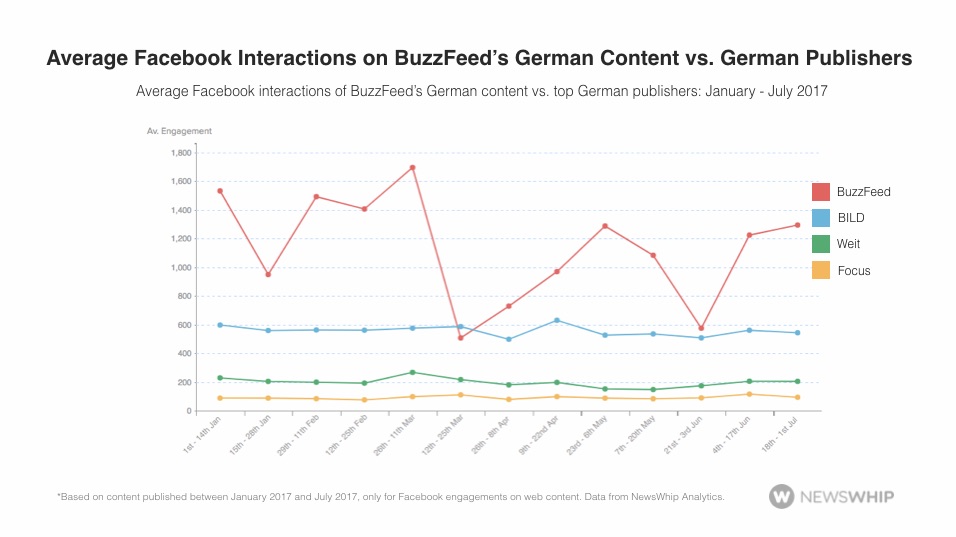Secure your place at the Digiday Media Buying Summit in Nashville, March 2-4

With Germany’s federal election coming up Sept. 24, BuzzFeed Germany is pushing further into news and politics coverage, following the playbook of its U.S. and U.K. news teams that have debunked fake-news stories spreading on social media.
In April, BuzzFeed hired Daniel Drepper as editor-in-chief. Drepper co-founded Correctiv, the not-for-profit organization Facebook partnered with to fact-check stories. He’s tasked with building BuzzFeed Germany’s news team, which will have five people once another position is filled, roughly the same number as BuzzFeed Germany’s entertainment team.
“BuzzFeed understands the internet,” Drepper said. “I want to combine serious news reporting and the lessons BuzzFeed has learned in the last few years.”
Drepper pointed to three articles from his team in the last few months that he said have performed well: One uncovered a fabricated story about the Germanwings plane crash in 2015; another reported the number of police injuries was exaggerated during protests at the G-20 summit, which other national news sites picked up and published; and the third revealed that seven out of the 10 most viral stories on Facebook about German Chancellor Angela Merkel are fake.
The increased focus on hard news comes as 3-year-old BuzzFeed Germany has struggled to gain viewers and advertisers in Germany with its focus on quiz-like content and irreverent humor.
So far, with more focus on listicles and entertainment coverage, BuzzFeed hasn’t pulled big audiences in Germany. In June, it had 3.5 million monthly unique visitors, out of an internet population of about 57 million, according to comScore. BuzzFeed does distribute across 30 platforms. At BuzzFeed Germany’s launch, then-editor-in-chief Juliane Leopold said she hoped to grow its social media following beyond 1 million users before introducing more news coverage. As of Aug. 9, BuzzFeed Deutschland has less than 500,000 Facebook fans. Twitter, which has also struggled to take hold in Germany, only brings BuzzFeed Germany about 9,000 followers.
But BuzzFeed Germany has to compete with long-established local publishers like Gruner + Jahr, plus local digital competitors like Heftig, with more than 2 million Facebook followers, and homegrown social platforms.
Although BuzzFeed Germany’s follower count and the number of articles it publishes to Facebook is less than local competitors, data from NewsWhip shows Facebook engagement on each of its posts is greater. It’s not uncommon for smaller audiences to be more engaged.

Still, without much reach, BuzzFeed Germany has struggled to gain relevance with some advertisers.
“The offering from BuzzFeed is just too narrow. You need a holistic role for the brand to play rather than single campaigns, but you can’t cover that with a small team,” said Norman Wagner, managing director of MediaCom Beyond Advertising.
“The requests for native advertising on BuzzFeed in our agency are still quite limited,” said Kristin Seidler, content manager at Havas Media, adding that she expects the demand for native advertising in general to grow in the next two years as audiences become harder to reach.
Partly this is because BuzzFeed’s London-based business team handles sales and monetization across Europe, which can be a barrier in gaining traction among local agencies. It has run ad campaigns in Germany for the last year with brands like Volkswagen, Diageo and Universal Pictures. However, Wagner said BuzzFeed recognizes cultural nuances, pointing to BuzzFeed spinoff Einfach Tasty (which translates to “Easy Tasty”), which is focused on healthy eating rather than the cheese-stuffed foods its U.S. counterpart features — and its 2.4 million Facebook followers.
Historically, Germany has been a tricky market for international companies, including those in classified, display and social media, to establish themselves, said Alex DeGroote, media analyst at Cenkos Securities, adding that the threshold for listicle content in Germany is lower than in BuzzFeed’s other markets.
More in-depth journalism could improve BuzzFeed Germany’s image, said Wagner. “BuzzFeed’s site doesn’t have the quality touch,” he said. “It looks like, ‘I know the mechanics of how to get traffic.’ It doesn’t look like, ‘I can do good journalism,’ yet.”
Still, the early signs of BuzzFeed’s foray into more political journalism are encouraging, partly because readers can see the novelty in BuzzFeed’s coverage compared to its three years of entertainment content, according to Drepper. “People don’t expect us to do news. Seeing it come from BuzzFeed means they are giving us more credit than they would a traditional newspaper,” he said. “We’re on a quest to convince people to keep us in mind; we’re trying to enforce it through our deeper analysis.”
More in Media

Media Briefing: Turning scraped content into paid assets — Amazon and Microsoft build AI marketplaces
Amazon plans an AI content marketplace to join Microsoft’s efforts and pay publishers — but it relies on AI com stop scraping for free.

Overheard at the Digiday AI Marketing Strategies event
Marketers, brands, and tech companies chat in-person at Digiday’s AI Marketing Strategies event about internal friction, how best to use AI tools, and more.

Digiday+ Research: Dow Jones, Business Insider and other publishers on AI-driven search
This report explores how publishers are navigating search as AI reshapes how people access information and how publishers monetize content.








